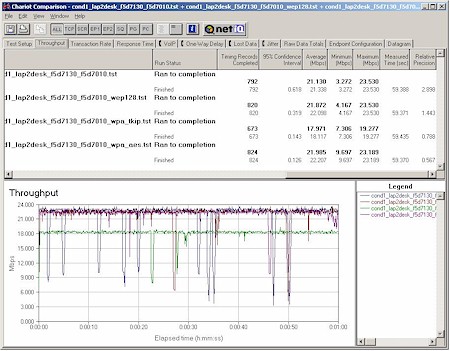Wireless Security
I then checked to see whether enabling WEP or WPA caused a throughput hit. Figure 7 tells the tale.

Figure 7: Normal, WEP, WPA throughput comparison
(click on the image for a full-sized view)
The results are a mixed good-news / bad-news story. The good news is that you don't have to take a throughput hit when enabling either WEP or WPA-based security. The bad is that when using WPA you must use the AES encryption mode to avoid the 15% throughput reduction that you'll get using TKIP encryption.
Since AES is not part of the WPA spec, it's not supported by all WPA-compliant products, and WPA-enabled APs can't simultaneously support both TKIP and AES WPA clients. So if you have an all-Belkin (or Broadcom-based) 11g WLAN, you'll be ok using WPA with the optional AES encryption. But other product combinations could result in a WPA-enabled throughput hit.
Even with this issue, however, I still strongly encourage you to use WPA and not worry about the throughput hit. The improved security is worth it and 11g has bandwidth to spare for most SOHO users.